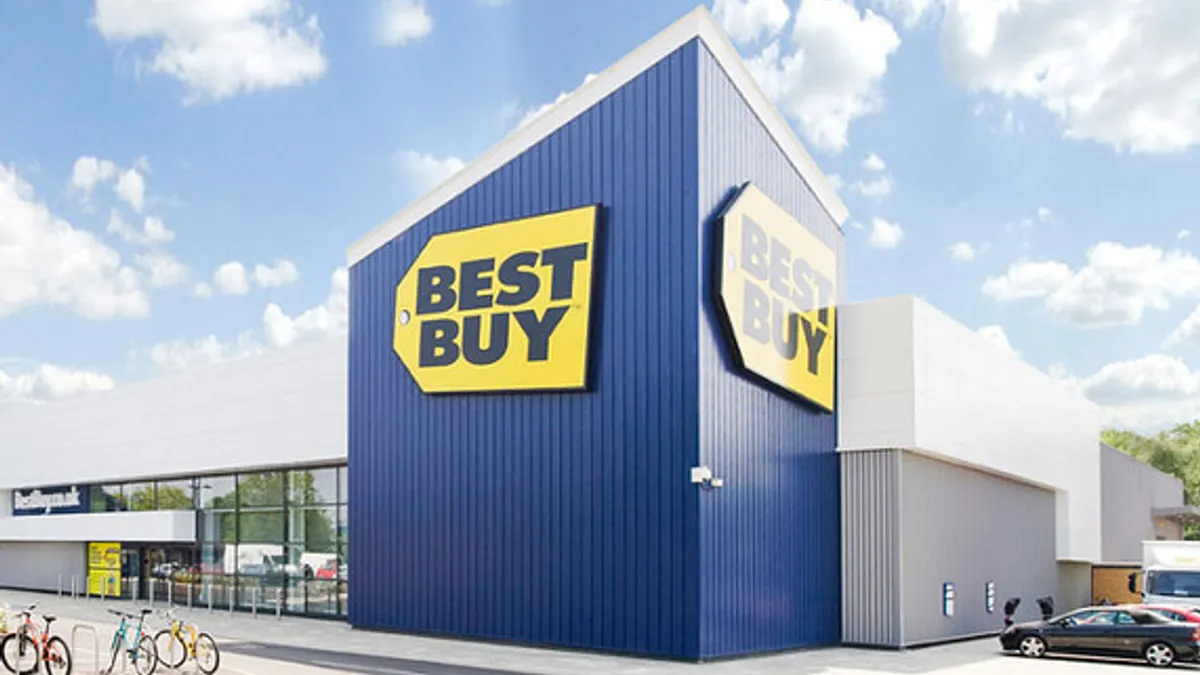Dive Brief:
-
Best Buy on Tuesday reported second quarter net earnings rose to $209 million, or 67 cents per share for the quarter, up from $198 million, or 61 cents per share in the year-ago period. Adjusted earnings per share rose 21% to 69 cents per share from 57 cents a year ago, well past the Zacks Consensus Estimate of 63 cents.
-
Revenue surged 4.8% to $8.940 billion (beating the Zacks Consensus Estimate of $8.66 billion), as domestic revenue rose 4.9% over last year to $8.3 billion, driven by same-store sales growth of 5.4%, (partially offset by the loss of revenue from 11 large format and 42 Best Buy Mobile store closures), according to a company press release.
-
U.S. e-commerce same-store sales grew 31.2% to $1.1 billion, primarily due to higher conversion rates and increased traffic, the company said. As a percentage of total domestic revenue, online revenue increased 260 basis points to 13.2% versus 10.6% last year. In general, same-store sales on and offline benefited from growth in computing, wearables, smart home, mobile phones and appliances, partially offset by declines in tablets, the company said.
Dive Insight:
Best Buy took investors by surprise Tuesday showing that the brick-and-mortar electronics retailer can hold its own against Amazon. In fact, in a note emailed to Retail Dive, GlobalData Retail Managing Director Neil Saunders said the retailer is doing better than that. "The 4.9% increase in domestic sales underlines that the company is more than holding its own in the electricals market and should put pay to the oft repeated fiction that retailers of its ilk will struggle to survive in the era of Amazon," he said.
Best Buy's Q2 performance was impressive on multiple fronts, Moody’s Lead Retail Analyst Charlie O’Shea said in a note emailed to Retail Dive. "Gross margin held steady with 2016, which we believe is particularly meaningful given the impact of Amazon’s Prime Day, which creates a heightened promotional environment throughout retail both before and after, especially for retailers involved in the consumer electronics segment."
Appliances continue to be a bright spot, O’Shea also said, noting that Moody’s expects the favorable trends to continue for the rest of the year and overall momentum to continue to build.
The retailer is doing many of the right things, including offering newer technologies like smart home, says Saunders, which will allow the retailer to engage and inform new consumers. Best Buy is also currently hiring hundreds of salespeople to make in-home consultations, another effort to drive sales of TVs and other devices, MarketWatch reports.
There are many underlying reasons for Best Buy's success, Saunders said, including superior service in stores that gives online buyers confidence when it comes to support and returns. The classic advantage of brick and mortar — the ability to see and try merchandise — is proving to be critical, he said. "Here, Best Buy's stores are a valuable asset and this should allow it to withstand the recent decision of Sears to sell some appliance brands via Amazon."
Best Buy is clearly aware of the challenge from Amazon, according to data from Frank N. Magid Associates emailed to Retail Dive, and enjoys some advantages. While customer traffic is lower, a larger average ticket size allows Best Buy to stay equal to Amazon and its stores have staying powering within higher income segments, according to a note from Magid Senior Vice President of Retail Matt Sargent. A longer-term concern, however, is that Best Buy enjoys a low relative share compared to Amazon among younger generations. "As millennials 'age up' into higher income segments, Best Buy needs to figure out how to better attract this segment," Sargent said.
Despite the positive results, Best Buy's stock took a tumble on Tuesday. "I was surprised that the stock has come down so much so quickly as [Best Buy's] performance by all accounts was stronger than expected, but I think the market is reacting to [its] comments that the strong sales are not the 'new normal,'" Sargent said. "I believe traders are reading between the lines that Amazon competition will cause [the retailer] to slow in the back half of the year."
That makes sense, Sargent said, when thinking about holiday spending. The first half of the year draws tech enthusiasts (Best Buy's best customers) where the second half brings less tech-engaged gift buyers, according to Sargent. "[Best Buy] will struggle to hold its share of these gift buyers as Amazon becomes more proficient (through Prime) as serving these customers. What's interesting is that this is not a new phenomenon and shouldn't be that surprising to people who understand Best Buy." But that may have slowly dawned on Wall Street Tuesday morning.
Still, GlobalData Retail expects more retailers to depart the electronics segment, and that will give Best Buy even more space to work with. Saunders said the company is being smart about leveraging its best stores, but is also pruning its footprint in a thoughtful way.














